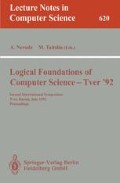Abstract
This paper presents an interval-based modal logic for specification of real-time systems and knowledge representation. A real-time system is understood as a time-dependent dynamic entity whose attributes can be observed and changed by performing actions. We take linear and dense time as our underlying time model, which can be characterised by the rationals. In our formalism, modal operators on formulas are defined by time intervals and modal operators on terms are defined by time instants and actions. Actions are not instantaneous but take some time to be performed. Different actions can take place at the same time. The proposed logic can also allow to specify obligations and prohibitions of actions over a period of time in deontic sense.
Preview
Unable to display preview. Download preview PDF.
References
J.F. Allen, Maintaining knowledge about temporal interval, CACM 26(11), 832–843, 1983
J.F. Allen, Towards a general theory of action and time, Artificial Intelligence, (2), 123–154, 1984
J. van Benthem, The Logic of Time, Dordrecht, Dordrecht, 1983
B.F. Chellas, Modal Logic: An Introduction, Cambridge University Press, 1980
J. Fiadeiro, & A. Sernadas, Logics of modal terms for system specification, J. of Logic and Computation, 1(2), 1990,187–227
J. Halpern & Y. Shoham, A prepositional modal logic of time intervals, 1st IEEE Symposium on Logic in Computer Science, 279–292, 1986
R. Hilpinen (ed.) Deontic Logic: Introductory and Systematic Readings, Dordrecht, Reidel, 1971
J. Halpern, Z. Manna, B. Moszkowski, A hardware semantics based on temporal intervals, Proc. of 10th Conf. on Automata, Language, and Programming, Barcelona, 1983, 278–291
R. Li, A. Sernadas, Reasoning about objects using tableau method, J. Logic and Computation, 2(4), 1991
T.S. Maibaum, A logic for the formal requirements specification of real time embedded systems, Alvey Formal Requirements Specification (Project SE015), Forest Project, 1987
B. Moszkowski & Z. Manna, Reasoning in interval temporal logic, LNCS 164 (1984), 371–384
K.T. Narayana & A.A. Aaby, Specification of real-time systems in real time temporal interval logic, Proc. of Real-Time Systems Symposium, 86–95, IEEE Computer Society, Dec. 1988
Y. Venema, Expressiveness and completeness of an interval tense logic, University of Amsterdam, 1988 (also to appear in Notre Dame Journal of Formal Logic)
Author information
Authors and Affiliations
Editor information
Rights and permissions
Copyright information
© 1992 Springer-Verlag Berlin Heidelberg
About this paper
Cite this paper
Li, R., Carmo, J. (1992). An interval-based modal logic for system specification. In: Nerode, A., Taitslin, M. (eds) Logical Foundations of Computer Science — Tver '92. LFCS 1992. Lecture Notes in Computer Science, vol 620. Springer, Berlin, Heidelberg. https://doi.org/10.1007/BFb0023882
Download citation
DOI: https://doi.org/10.1007/BFb0023882
Published:
Publisher Name: Springer, Berlin, Heidelberg
Print ISBN: 978-3-540-55707-4
Online ISBN: 978-3-540-47276-6
eBook Packages: Springer Book Archive

